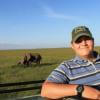Greetings all! In case you want to learn more about HWC in India, Mongabay has recently published an article by Mike Gaworecki highlighting the need for solutions to HWC in India.
Rate of human-wildlife conflict in India has researchers making urgent appeals for solutions
Researchers in India are calling for measures to improve human-wildlife conflict management across the country after a study revealed the frequency with which clashes between animals and people are resulting in property damage, injury, and even death.
- Between 2011 and 2014, Dr. Krithi Karanth, a conservation scientist with the Wildlife Conservation Society, and Sahila Kudalkar, a research associate with the Centre for Wildlife Studies, surveyed 5,196 families from 2,855 villages adjacent to 11 different wildlife reserves in western, central, and southern India.
- The researchers found that 71 percent of households surveyed have lost crops to wild animals, 17 percent have lost livestock, and three percent have had human injury or death result from a run-in with wildlife.
- Tallying these losses and understanding the methods used to mitigate the impacts of human-wildlife conflict is crucial to designing better policies to deal with the problem, Karanth and Kudalkar write in the study.
Give it a read if you have a minute, and best of luck with the challenge!
5 July 2017 11:32am
@SamWilliams highlighted another timely publication fresh off the press yesterday that might be of interest to folks looking into the Polar Bear case:
Polar bear attacks on humans: Implications of a changing climate
James M. Wilder, Dag Vongraven, Todd Atwood, Bob Hansen, Amalie Jessen, Anatoly Kochnev, Geoff York (@gyork), Rachel Vallender, Daryll Hedman, Melissa Gibbons
Understanding causes of polar bear (Ursus maritimus) attacks on humans is critical to ensuring both human safety and polar bear conservation. Although considerable attention has been focused on understanding black (U. americanus) and grizzly (U. arctos) bear conflicts with humans, there have been few attempts to systematically collect, analyze, and interpret available information on human-polar bear conflicts across their range. To help fill this knowledge gap, a database was developed (Polar Bear-Human Information Management System [PBHIMS]) to facilitate the range-wide collection and analysis of human-polar bear conflict data. We populated the PBHIMS with data collected throughout the polar bear range, analyzed polar bear attacks on people, and found that reported attacks have been extremely rare. From 1870–2014, we documented 73 attacks by wild polar bears, distributed among the 5 polar bear Range States (Canada, Greenland, Norway, Russia, and United States), which resulted in 20 human fatalities and 63 human injuries. We found that nutritionally stressed adult male polar bears were the most likely to pose threats to human safety. Attacks by adult females were rare, and most were attributed to defense of cubs. We judged that bears acted as a predator in most attacks, and that nearly all attacks involved ≤2 people. Increased concern for both human and bear safety is warranted in light of predictions of increased numbers of nutritionally stressed bears spending longer amounts of time on land near people because of the loss of their sea ice habitat. Improved conflict investigation is needed to collect accurate and relevant data and communicate accurate bear safety messages and mitigation strategies to the public. With better information, people can take proactive measures in polar bear habitat to ensure their safety and prevent conflicts with polar bears. This work represents an important first step towards improving our understanding of factors influencing human-polar bear conflicts. Continued collection and analysis of range-wide data on interactions and conflicts will help increase human safety and ensure the conservation of polar bears for future generations. © 2017 The Wildlife Society.
Happy designing!

24 July 2017 9:04am
Additional information on human-polar bear conflicts can be found in this article










Stephanie O'Donnell
WILDLABS